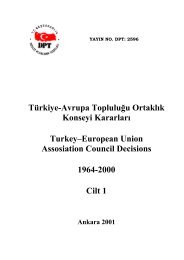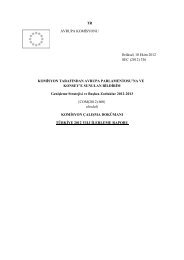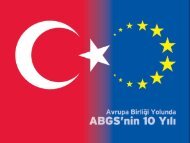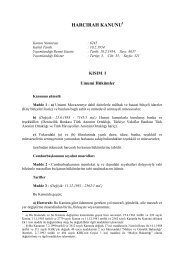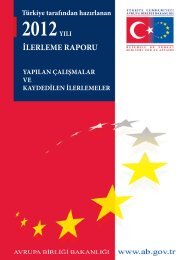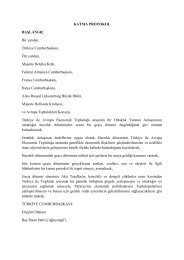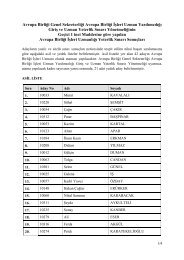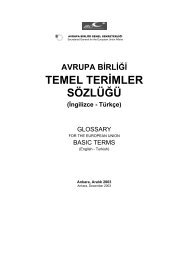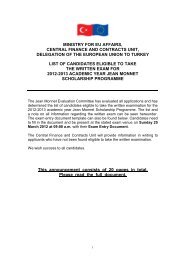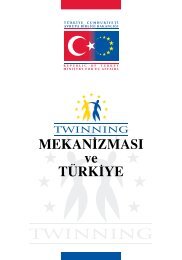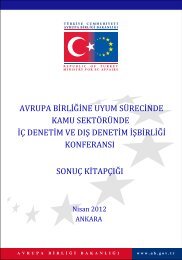2010 ilerleme raporu - Avrupa BirliÄi BakanlıÄı
2010 ilerleme raporu - Avrupa BirliÄi BakanlıÄı
2010 ilerleme raporu - Avrupa BirliÄi BakanlıÄı
You also want an ePaper? Increase the reach of your titles
YUMPU automatically turns print PDFs into web optimized ePapers that Google loves.
finances. But the earmarked funds of €500 million were underutilised, as only seven SMEs<br />
had received credit guarantee support by 31 March <strong>2010</strong>. The large informal sector which is<br />
fuelled by weaknesses in tax and expenditure policies, as well as in law enforcement, remains<br />
an important challenge. Turkey therefore adopted a comprehensive action plan to combat the<br />
informal economy in 2009. Overall, the crisis slowed down or even reversed structural shifts<br />
in economic activity. In spite of new initiatives by the Turkish government, the crisis has<br />
complicated access to finance for SMEs.<br />
State influence on competitiveness<br />
There has been no tangible progress in the field of state aid. As transparency in the decisionmaking<br />
process remains low, it is still difficult to judge the rationale and consistency of the<br />
individual decisions taken. In addition, the scale of state aid and its importance in some key<br />
sectors are likely to have increased substantially following the introduction of the various<br />
fiscal stimulus packages. Adoption of the commercial code has again been postponed. The<br />
absence of transparent monitoring of state aid and of supporting policies to reduce distortion<br />
continued to have an adverse effect on competition and competitiveness in the economy.<br />
Public procurement policies continued to be undermined by exceptions to the regulatory<br />
framework. Overall, state intervention continued to be untransparent, which might have had a<br />
negative effect on competition and competitiveness.<br />
Economic integration with the EU<br />
The openness of the Turkish economy, as measured by the total value of exports of goods and<br />
services as a percentage of GDP, decreased to about 47.5% of GDP by the end of 2009, from<br />
52.2% in 2008, largely in line with the crisis-led contraction in world trade. The EU’s share of<br />
Turkey’s total trade increased from 41.4% in 2008 to 42.6% in 2009. Its share in Turkey’s<br />
exports decreased from 48% in 2008 to 46% in 2009. While the EU’s share of Turkey’s trade<br />
varies slightly from year to year, depending on numerous factors, including commodity price<br />
trends and exchange rate movements, its decline in Turkey’s exports is likely to be the result<br />
of relatively more subdued demand in the EU. Simultaneously, Turkey was somehow able to<br />
diversify its exports towards other regions. The share of exports to African and Middle East<br />
countries in Turkey’s total exports increased from 10% in 2008 to over 20% in 2009. FDI<br />
inflows to Turkey from EU Member States remained very significant, growing from 75% of<br />
the total in 2008 to 80% in 2009, thus illustrating the strong economic interdependence<br />
between the EU and Turkey. Overall, trade and economic integration with the EU remained<br />
high. Turkey was able to diversify part of its trade towards new markets, thereby partly<br />
alleviating the impact of the crisis.<br />
Incipient nominal exchange rate appreciation pressures were observed in the first half of<br />
<strong>2010</strong>. In the year to July <strong>2010</strong>, the exchange rate for the lira appreciated by 5% in nominal<br />
terms against a basket of 50% US dollar and 50% euro. In real effective terms, corrected for<br />
both producer and consumer price developments, the lira strengthened by 8%. Overall,<br />
standard indicators suggest that Turkey’s export competitiveness has stopped improving.<br />
4. ABILITY TO ASSUME THE OBLIGATIONS OF MEMBERSHIP<br />
This section examines Turkey's ability to assume the obligations of membership – that is, the<br />
acquis as expressed in the Treaties, the secondary legislation and the policies of the Union. It<br />
also analyses Turkey's administrative capacity to implement the acquis. The analysis is<br />
structured in accordance with the list of 33 acquis chapters. In each sector, the Commission's<br />
EN 44 EN




